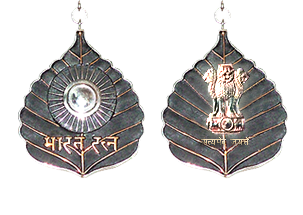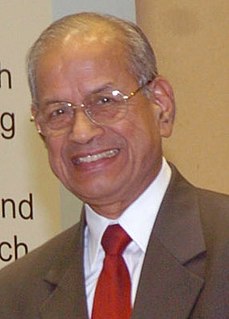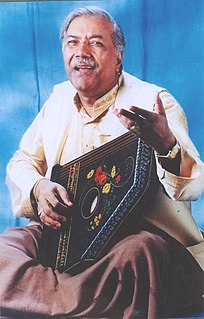
The Bharat Ratna is the highest civilian award of the Republic of India. Instituted on 2 January 1954, the award is conferred in recognition of "exceptional service/performance of the highest order", without distinction of race, occupation, position, or sex. The award was originally limited to achievements in the arts, literature, science, and public services, but the government expanded the criteria to include "any field of human endeavour" in December 2011. The recommendations for the Bharat Ratna are made by the Prime Minister to the President, with a maximum of three nominees being awarded per year. The recipients receive a Sanad (certificate) signed by the President and a peepal leaf-shaped medallion. There is no monetary grant associated with the award. Bharat Ratna recipients rank seventh in the Indian order of precedence.

The Padma Vibhushan is the second-highest civilian award of the Republic of India, after the Bharat Ratna. Instituted on 2 January 1954, the award is given for "exceptional and distinguished service". All persons without distinction of race, occupation, position or sex are eligible for these awards. However, government servants including those working with PSUs, except doctors and scientists, are not eligible for these Awards. As of 2020, the award has been bestowed on 314 individuals, including seventeen posthumous and twenty-one non-citizen recipients.
The Padma Bhushan is the third-highest civilian award in the Republic of India, preceded by the Bharat Ratna and the Padma Vibhushan and followed by the Padma Shri. Instituted on 2 January 1954, the award is given for "distinguished service of a high order...without distinction of race, occupation, position or sex." The award criteria include "service in any field including service rendered by Government servants" including doctors and scientists, but exclude those working with the public sector undertakings. As of 2020, the award has been bestowed on 1270 individuals, including twenty-four posthumous and ninety-seven non-citizen recipients.

Elattuvalapil Sreedharan is an Indian engineer and politician from the Indian state of Kerala. He is credited with changing the face of public transport in India with his leadership in building the Konkan Railway and the Delhi Metro while he served as the managing director of Delhi Metro Rail Corporation (DMRC) between 1995 and 2012. Known as the Metro Man, he was awarded the Padma Shri by the Government of India in 2001, the Padma Vibhushan in 2008, the Chevalier de la Légion d'honneur in 2005 by the French government and was named one of Asia's Heroes by Time magazine in 2003. Sreedharan was appointed by the former UN Secretary General Ban Ki-moon to serve on the United Nations's High Level Advisory Group on Sustainable Transport (HLAG-ST) for a period of three years in 2015. He is a member of Mata Vaishno Devi Shrine Board. Currently he serves as a national executive council member of BJP. He quit from active politics on 16 December 2021.

Vaidya Suresh Chaturvedi (1928-2017) was an Ayurveda practitioner from Rajasthan, India. Previously he was a professor at Bombay University and has written many books on Ayurveda. In 2000, he was awarded the Padma Shri, the fourth highest civilian award in the India. As an active practitioner of the ancient science of Ayurveda (healing), he is known in the national and international arenas of alternate medicines and has presented numerous papers. He has held a number of conferences in India. He was, a Ph.D guide in the University of Mumbai.

Ustad Ghulam Mustafa Khan was an Indian classical musician in the Hindustani classical music tradition, belonging to the Rampur-Sahaswan Gharana.
Brahmdeo Ram Pandit is an Indian studio potter and craftsman, known for his expertise in making pottery. He was honoured by the Government of India, in 2013, by bestowing on him the Padma Shri, the fourth highest civilian award, for his contributions to the field of art.
S. Shakir Ali, is an Indian painter, known for his Mughal and Persian miniature paintings. He was honoured by the Government of India, in 2013, by bestowing on him the Padma Shri, the fourth highest civilian award, for his contributions to the field of art.
Amit Prabhakar Maydeo, is an Indian Gastroenterologist and endoscopy expert, known for his pioneering efforts on therapeutic endoscopy and endoscopic retrograde cholangiopancreatography (ERCP). He was honoured by the Government of India, in 2013, by bestowing on him the Padma Shri, the fourth highest civilian award, for his contributions to the fields of medicine and medical education. His son, Dr. Rohan maydeo is also a surgeon from MGM Medical College and Hospital, Aurangabad.
Deviprasad Dwivedi is an Indian writer and teacher, known for his scholarship in Sanskrit literature. The Government of India honoured Sharma in 2011, with the fourth highest Indian civilian award of the Padma Shri and followed it up with Padma Bhushan, the third-highest civilian award, in 2017.

Khumanthem Ningol Nameirakpam Ongbi Ibemni Devi is an Indian singer of traditional music, known for her expertise in the Khongjom Praba genre of Manipuri music. The Government of India honored Ibemni Devi in 2012, with the fourth highest civilian award of Padma Shri.
Gutta Muniratnam was an Indian social worker, a member of the National Planning Commission of India and the founder of Rashtriya Seva Samithi (RASS), a non governmental organization engaged in the social welfare activities in over 2500 socio-economically backward villages in the Rayalaseema region, spread across the present day states of Andhra Pradesh and Telangana. He was honored by the Government of India, in 2012, with the fourth highest Indian civilian award of Padma Shri.
Vijay Dutt Shridhar is an Indian journalist, writer and the founder of Madhav Sapre Museum of Newspapers and Research Institute. He was honored by the Government of India, in 2012, with the fourth highest Indian civilian award of Padma Shri.
Sachchidanand Sahai is an Indian epigraphist, writer and the scientific advisor to the Government of Cambodia for restoration of Angkor Wat and the Temple of Preah Vihear, known for his knowledge on Khmer civilization. He was honored by the Government of India, in 2012, with the fourth highest Indian civilian award of Padma Shri.
Prabhakar Vaidya is an Indian physical educationist, academic and the honorary secretary of Hanuman Vyayam Prasarak Mandal, a century old organization and a national institution working towards modernizing the traditional systems of Sports & Games. He was honored by the Government of India, in 2012, with the fourth highest Indian civilian award of Padma Shri.

Mohammad Sharaf-e-Alam is an Indian writer, educationist, scholar of Persian language and the first vice chancellor of Maulana Mazharul Haque Arabic and Persian University. He served at the university from 2004 till 2007 and has worked at B. N. College as the head of the department of Persian Language. He is also credited with several publications. Alam, a recipient of the Certificate of Honour from the Government of India, was honored again by the Government, in 2013, with the fourth highest Indian civilian award of Padma Shri.
Rajagopalan Krishnan Vaidyan was an Indian ayurvedic practitioner from the Indian state of Kerala and the president of the Association of Ayurvedic Physicians of Kerala.
Perakath Verghese Benjamin was an Indian physician and medical writer. Born in a Saint Thomas Christian family in the South Indian state of Kerala, Benjamin was a former Tuberculosis advisor to Government of India and a technical advisor to the Tuberculosis Association of India. He also served as the founder editor of the Indian Journal of Tuberculosis (IJT). He chronicled the efforts of the Indian Government in the fight against tuberculosis in the post independence era in a book, India's Fight Against Tuberculosis - 1956. The Government of India honoured him in 1955, with the Padma Shri, the fourth highest Indian civilian award for his contributions to the field of medicine. He was the first person from the state of kerala to win this award.
Roshan Kumari Fakir Mohammad is an Indian classical dancer, actor and choreographer, considered by many as one of the foremost exponents of the Indian classical dance form of Kathak. She follows the Jaipur Gharana and is the founder of Nritya Kala Kendra, Mumbai, an academy promoting Kathak. A recipient of the Sangeet Natak Akademi Award in 1975, she received the fourth highest Indian civilian honour of Padma Shri from the Government of India in 1984.






